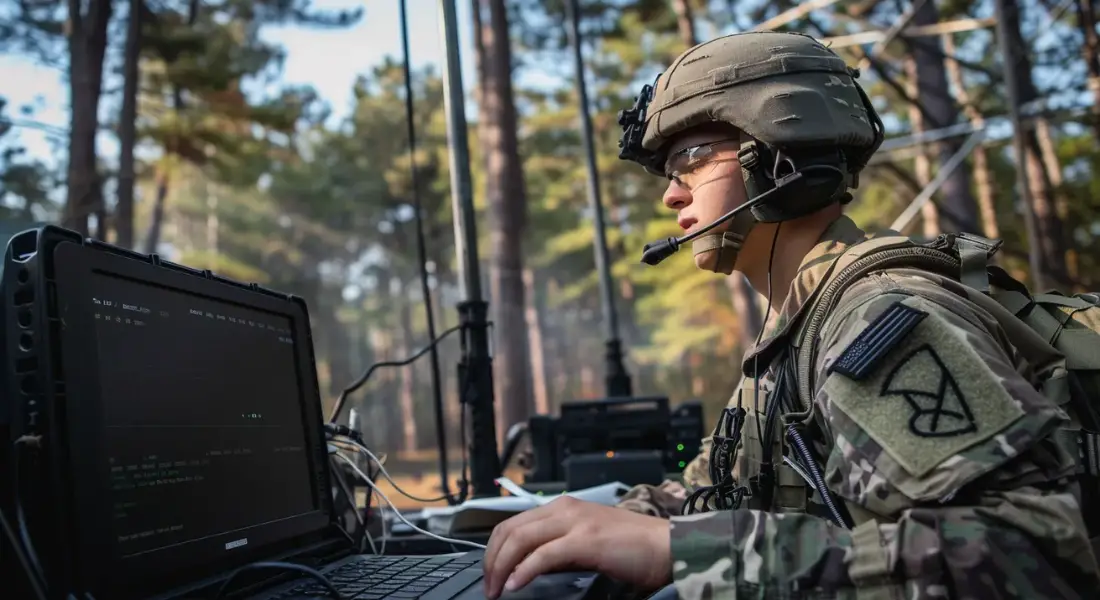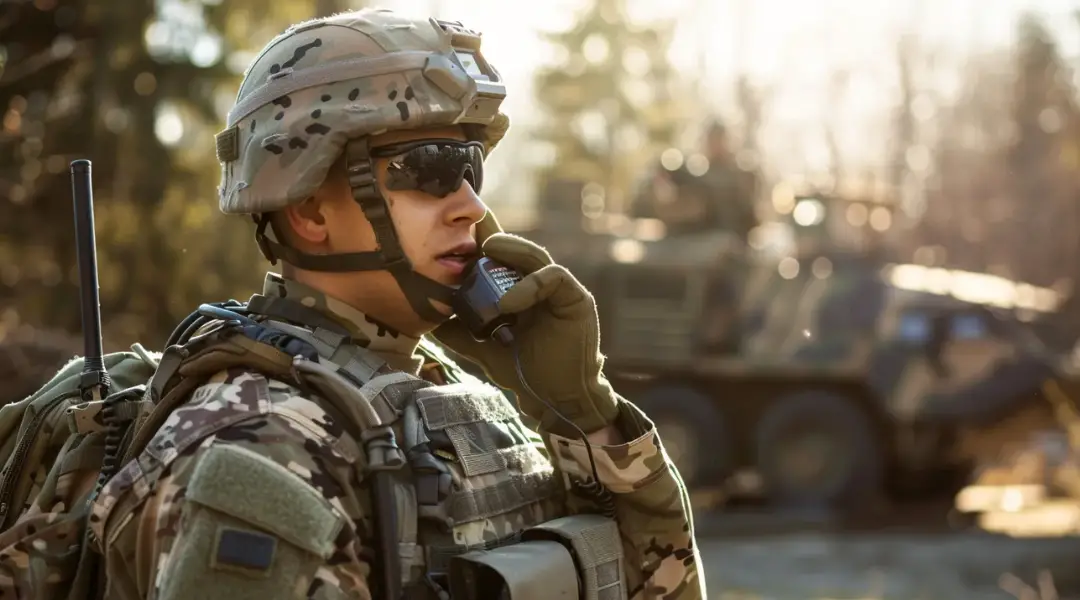The Army MOS 25T Satellite Microwave Systems Specialist plays a crucial role in maintaining and operating the communication systems that keep military operations running smoothly. This job involves working with cutting-edge satellite and microwave systems to ensure constant, reliable communication for the United States Army.
We’ll explore what it takes to be an Army MOS 25T Satellite Microwave Systems Specialist, including training requirements, job responsibilities, and the systems they work with.
What is an Army MOS 25T Satellite Microwave Systems Specialist?
The Army MOS 25T Satellite Microwave Systems Specialist is responsible for installing, operating, and maintaining satellite and microwave communication systems. These systems are vital for ensuring seamless communication across various Army units and operations. Without them, the ability of commanders to communicate with their troops and headquarters would be severely hindered.
MOS 25T specialists are trained in the technical and operational aspects of satellite and microwave communication systems. They coordinate the setup of satellite access, which includes working with a variety of equipment to ensure secure and uninterrupted communications. This role is critical to the Army’s mission, as communication is key to operational success.

What Does a 25T Satellite Microwave Systems Specialist Do?
A 25T Satellite Microwave Systems Specialist works primarily with satellite and microwave systems to facilitate long-range communications. They are responsible for installing and maintaining satellite antennas, microwave radios, and other communication equipment, ensuring that military networks remain functional at all times.
Daily tasks include troubleshooting equipment, configuring network settings, and monitoring communication statuses. Their expertise allows them to address issues quickly, ensuring that communication lines remain operational even in challenging environments. Additionally, they often assist in training personnel in the proper use of these systems, extending their influence beyond just technical operations.
What Kind of Training is Required for MOS 25T?
Training for MOS 25T Satellite Microwave Systems Specialist is extensive. After completing basic training, soldiers are required to attend Advanced Individual Training (AIT) where they learn the technical skills needed for the job. This training covers satellite systems, microwave technology, signal transmission, and more.
AIT also includes hands-on training with real-world equipment, giving soldiers the opportunity to apply what they’ve learned in a practical setting. This ensures that they can perform their duties effectively once deployed. Soldiers may also receive additional training as technologies evolve, enabling them to stay up to date with the latest advancements in communication technology.
What Types of Equipment Do MOS 25T Specialists Work With?
MOS 25T Satellite Microwave Systems Specialists work with a variety of advanced equipment. This includes satellite dishes, microwave transmitters, and receivers, as well as network infrastructure hardware. The systems they maintain are critical for command and control (C2) operations, enabling real-time coordination of military personnel and resources.
In addition to satellite communication systems, these specialists also work with tactical equipment designed to ensure communication in the field. This equipment is durable and reliable, capable of withstanding harsh conditions while still delivering high-quality performance.
How Does MOS 25T Contribute to Military Intelligence?
The MOS 25T Satellite Microwave Systems Specialist also plays a role in military intelligence by ensuring the secure transmission of critical data. Communication systems are often used to share intelligence gathered from the field, making it essential that these systems remain functional and secure.
Satellite and microwave systems provide a secure method for transmitting intelligence information, minimizing the risk of interception. MOS 25T specialists are responsible for maintaining the integrity of these communications, ensuring that intelligence data can be shared without compromise.
What Career Opportunities Are Available for MOS 25T Specialists?
After serving in the Army, MOS 25T specialists often find civilian careers in telecommunications, satellite communications, and IT fields. The skills they learn while working with satellite and microwave systems are in high demand in both the public and private sectors.
Veterans with this specialization often find jobs with companies that support Department of Defense (DoD) communication systems or in industries that require advanced communication networks. This makes MOS 25T a valuable stepping stone for those who want to transition into civilian technical careers after their military service.
What Role Does a 25T Satellite Microwave Systems Specialist Play in Army Operations?
In Army operations, MOS 25T specialists are responsible for establishing and maintaining communication links between units. They work in headquarters, field environments, and even command centers, ensuring that communication systems are operational and supporting the mission.
Their role is often behind the scenes, but it is no less critical. Without reliable communication, field units cannot receive updates or orders from headquarters, making it impossible to coordinate large-scale military operations. In this sense, the work of MOS 25T specialists is directly tied to the success of missions across all branches of the military.
What Does a Day in the Life of a MOS 25T Specialist Look Like?
A typical day for a MOS 25T Satellite Microwave Systems Specialist involves a mix of routine maintenance, troubleshooting, and system monitoring. They may spend time configuring satellite links, running tests to ensure optimal signal strength, or training other personnel on the use of communication equipment.
In field environments, these specialists are often on call to address any issues that arise with communication systems. Their work is crucial to the operational readiness of their units, and they must be able to respond quickly to ensure that communication lines remain open at all times.
Bullet-Point Summary: Key Takeaways About MOS 25T
- Army MOS 25T Satellite Microwave Systems Specialists ensure the installation, maintenance, and operation of satellite and microwave communication systems critical to Army missions.
- They receive extensive technical training in satellite and microwave communication systems, covering everything from equipment setup to troubleshooting.
- Communication is essential for the success of military operations, and MOS 25T specialists ensure that commanders can communicate securely with their units.
- MOS 25T specialists work with a variety of advanced communication equipment, including satellite dishes, microwave transmitters, and tactical communication devices.
- The skills learned as a MOS 25T can lead to career opportunities in the civilian world, especially in telecommunications and IT.
- Their role is critical to both military intelligence and operational success, ensuring secure and reliable communication for command and control.
- A typical day for a MOS 25T involves system monitoring, troubleshooting, and training personnel, all in support of maintaining communication networks.
MOS 25T specialists are a key part of the Army’s communication infrastructure, providing the secure and reliable systems that keep operations running smoothly.
FAQs
Q. What is a 25T in the Army?
A. The 25T Satellite Microwave Systems Specialist in the Army is responsible for installing, maintaining, and operating satellite and microwave communication systems. These systems are critical for ensuring reliable communication between different Army units and headquarters during operations. Soldiers in this MOS play a vital role in establishing secure and uninterrupted communication channels, which are essential for mission success.
Q. What is Army MOS 25S?
A. The Army MOS 25S Satellite Communication Systems Operator-Maintainer is tasked with installing, operating, and maintaining satellite communication (SATCOM) systems. These specialists are responsible for ensuring that satellite links remain functional and secure, allowing for long-range communications between commanders and their units. Their role is crucial in keeping military communication networks operational, especially during deployments.
Q. What is the Largest MOS in the Army?
A. The 11B Infantryman is one of the largest and most well-known MOS (Military Occupational Specialty) in the Army. Infantry soldiers are the backbone of ground combat operations and are often the largest group of personnel within the Army. They are responsible for engaging enemy forces on the battlefield, carrying out patrols, and performing a variety of tactical operations.
Q. Which MOS Sees the Most Combat?
A. Infantry MOSs (such as 11B Infantryman) typically see the most combat in the Army. These soldiers are directly involved in ground combat operations, often engaging the enemy face-to-face in combat zones. Special Forces units, such as 18X Special Forces Candidates or 19D Cavalry Scouts, may also see significant combat, especially during missions in high-risk environments or special operations.

